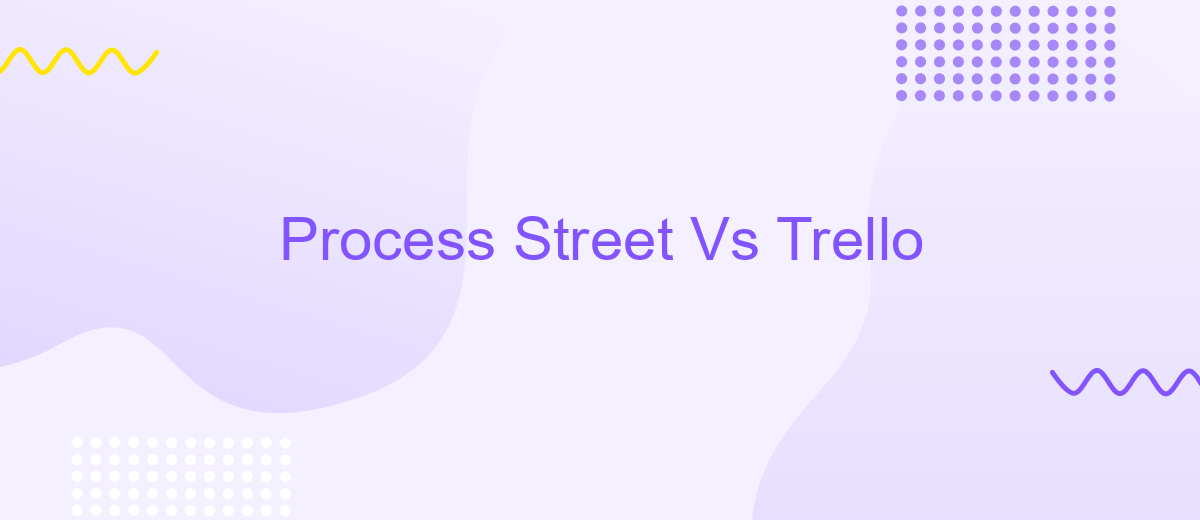Process Street Vs Trello
When it comes to project management tools, Process Street and Trello are two popular options that cater to different needs. Process Street excels in structured workflows and checklists, making it ideal for repetitive tasks. On the other hand, Trello offers a more flexible, visual approach with its kanban-style boards. In this article, we will compare the features, strengths, and weaknesses of both platforms.
Introduction: Overview of Process Street and Trello
Process Street and Trello are two prominent tools designed to streamline workflow management and collaboration. Process Street excels in creating and managing recurring checklists and procedures, making it ideal for businesses that rely heavily on standard operating procedures. Trello, on the other hand, uses a card and board system to help teams organize tasks and projects visually, offering flexibility and simplicity.
- Process Street: Focuses on checklists and workflows, ideal for repetitive tasks.
- Trello: Uses boards, lists, and cards to organize tasks, suitable for diverse project management needs.
Both tools offer integrations with various third-party services to enhance functionality. For instance, ApiX-Drive can be utilized to set up seamless integrations between Process Street, Trello, and other platforms, allowing for automated data transfers and improved efficiency. Understanding the strengths and use cases of each tool can help businesses choose the right solution for their specific needs.
Feature Comparison: Task Management, Collaboration, and Automation

When it comes to task management, Process Street offers a structured approach with checklists and templates, making it ideal for repetitive processes. Trello, on the other hand, uses a flexible board and card system that allows users to visually organize tasks and projects. Both platforms excel in their own ways, but Process Street's focus on repeatable workflows may be more suitable for teams looking for consistency, while Trello's visual boards cater to those who prefer a more dynamic task management system.
In terms of collaboration, Trello shines with its real-time updates and easy-to-use interface, allowing team members to comment, attach files, and move tasks across boards seamlessly. Process Street also supports collaboration but emphasizes process adherence and accountability with features like task assignments and due dates. Automation is another critical aspect where both tools offer integrations with various services. For instance, ApiX-Drive can automate workflows by connecting Process Street and Trello with other apps, enhancing productivity and reducing manual effort. This makes both tools versatile, but the choice depends on whether your priority is structured process management or flexible project visualization.
Pricing and Plan Comparison: Cost-effectiveness Analysis

When it comes to pricing and plans, Process Street and Trello offer different models that cater to various business needs. Understanding these differences is crucial for determining the cost-effectiveness of each platform.
- Process Street: Process Street offers a straightforward pricing model with a free plan for small teams and paid plans starting at .50 per user per month. The paid plans include advanced features like conditional logic, custom permissions, and integrations with third-party services.
- Trello: Trello provides a free plan with basic features suitable for individual use or small projects. Their paid plans start at per user per month with Trello Standard, which includes additional features such as advanced checklists, custom fields, and priority support. Trello Premium and Enterprise plans offer even more robust features and integrations.
For businesses needing extensive integrations and automation, services like ApiX-Drive can be beneficial. ApiX-Drive helps streamline and automate workflows by connecting various applications, enhancing the functionality of both Process Street and Trello. Considering these aspects, businesses should evaluate their specific needs and budget constraints to choose the most cost-effective solution.
Use Case Analysis: Identifying the Most Suitable Platform

When deciding between Process Street and Trello, it's essential to understand the specific use cases for each platform. Process Street excels in structured workflow automation, making it ideal for repetitive tasks and standard operating procedures. Trello, on the other hand, offers a more flexible, visual approach to project management, suitable for creative projects and team collaboration.
For businesses that require detailed process documentation and automation, Process Street is the clear choice. It allows for the creation of detailed checklists and workflows, ensuring that every step of a process is followed accurately. Trello is more suited for teams that need a visual overview of their projects and prefer a flexible structure.
- Process Street: Best for structured workflows and automation.
- Trello: Ideal for visual project management and team collaboration.
Additionally, both platforms can be enhanced with integrations. Services like ApiX-Drive can streamline the integration process, allowing users to connect Process Street or Trello with other essential tools seamlessly. This capability ensures that businesses can maximize the efficiency of their chosen platform.
Conclusion: Informed Decision-Making Based on Comparative Evaluation
Choosing between Process Street and Trello ultimately depends on your specific needs and workflow preferences. Process Street excels in creating and managing detailed, repeatable processes with its structured checklist format, making it ideal for businesses that require consistent task execution. On the other hand, Trello offers a more flexible, visual approach with its kanban-style boards, which can be customized to fit a wide range of project management scenarios.
For those seeking seamless integration with other tools, both platforms offer robust options. However, leveraging services like ApiX-Drive can further enhance your experience by automating integrations and streamlining workflows between various apps. By carefully evaluating the features, strengths, and integration capabilities of each platform, you can make an informed decision that aligns with your organizational goals and enhances productivity.
- Automate the work of an online store or landing
- Empower through integration
- Don't spend money on programmers and integrators
- Save time by automating routine tasks
FAQ
What are the main differences between Process Street and Trello?
Can Process Street and Trello be integrated with other tools?
Which platform is better for team collaboration?
Can I use both Process Street and Trello together?
Which tool is more user-friendly for beginners?
Do you want to achieve your goals in business, career and life faster and better? Do it with ApiX-Drive – a tool that will remove a significant part of the routine from workflows and free up additional time to achieve your goals. Test the capabilities of Apix-Drive for free – see for yourself the effectiveness of the tool.


